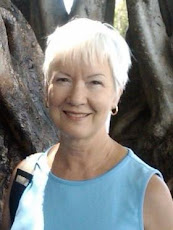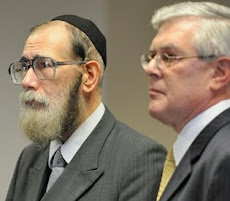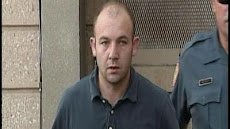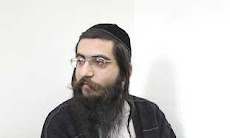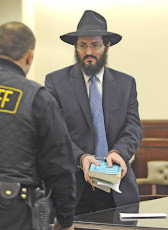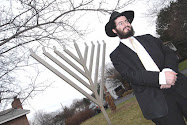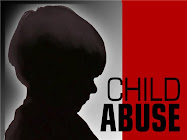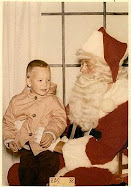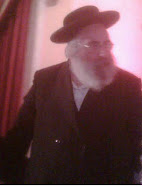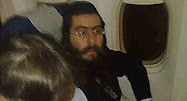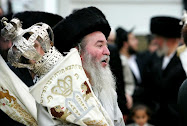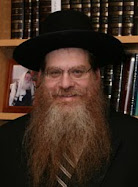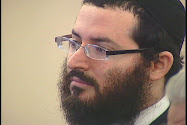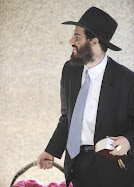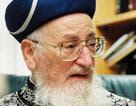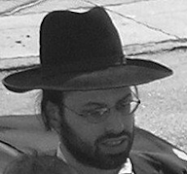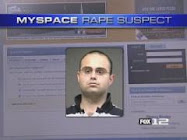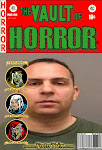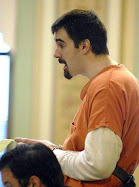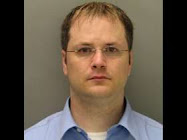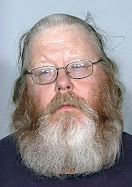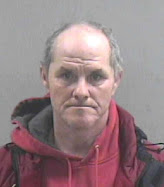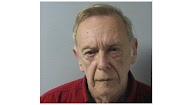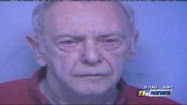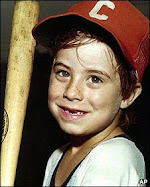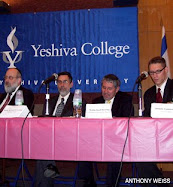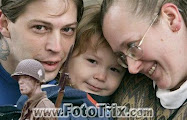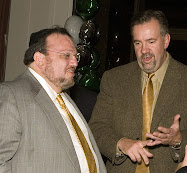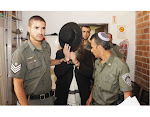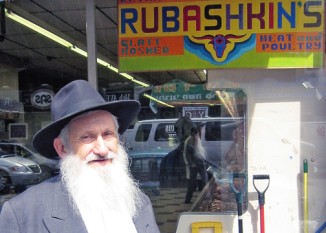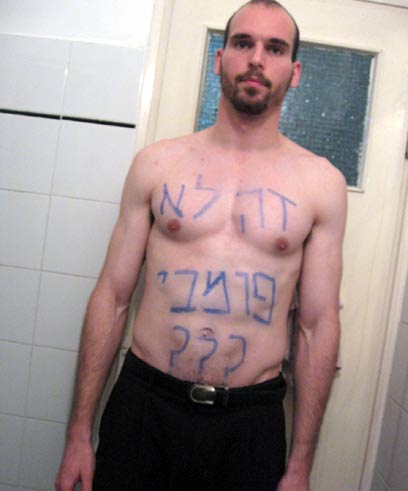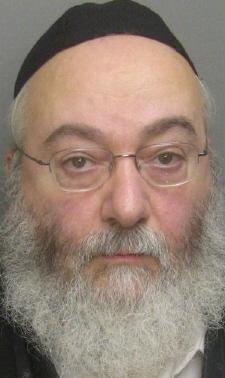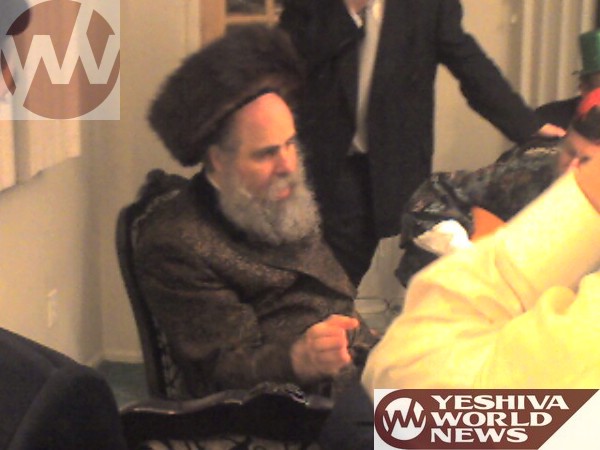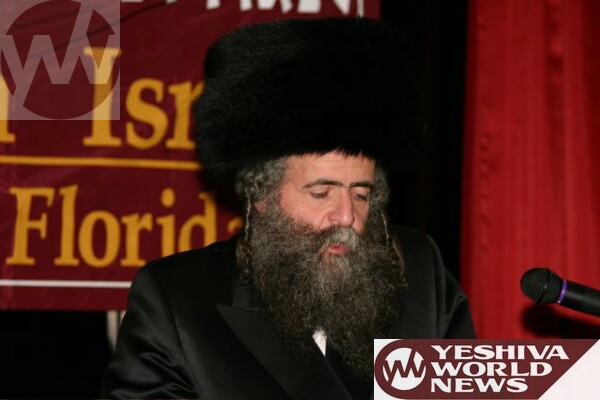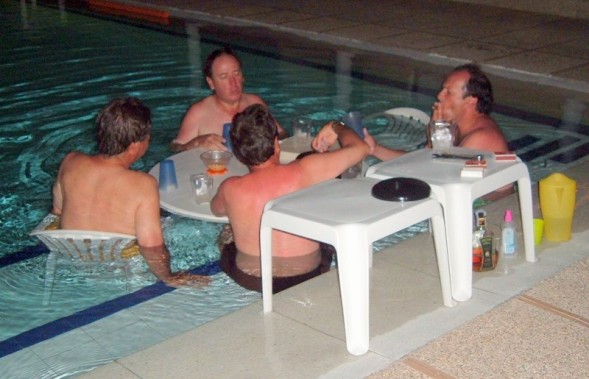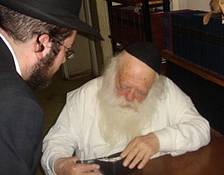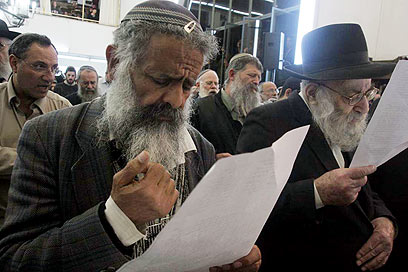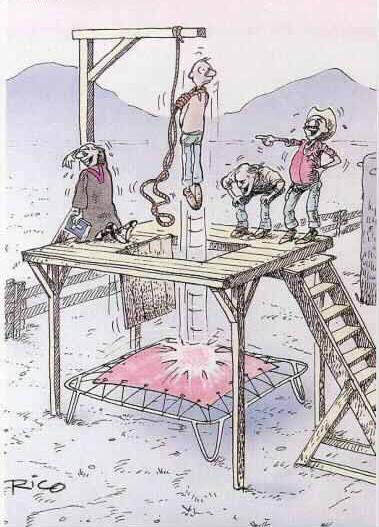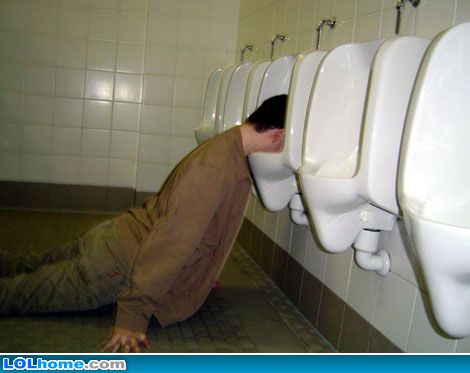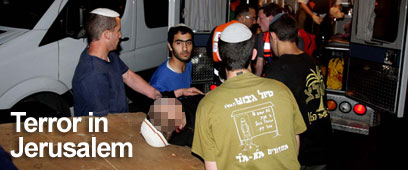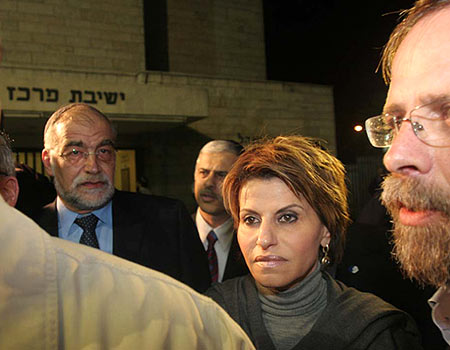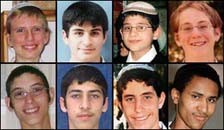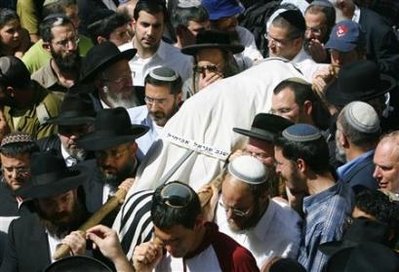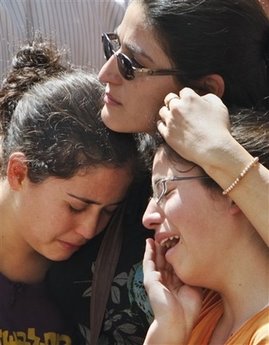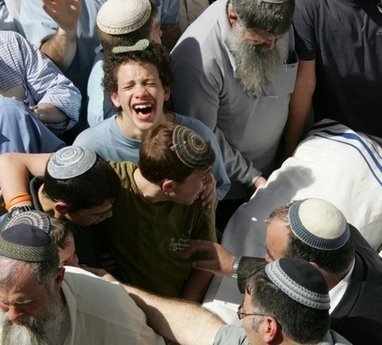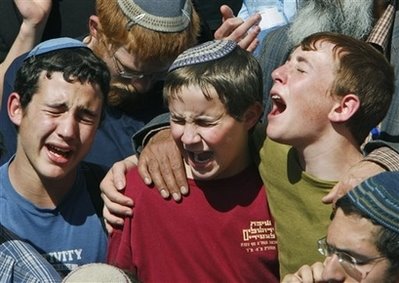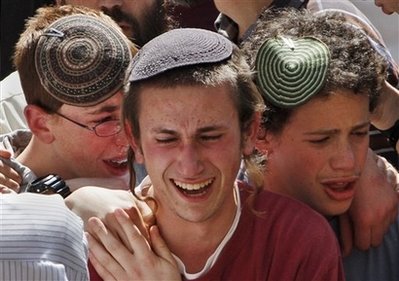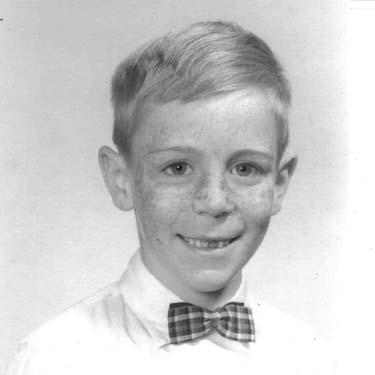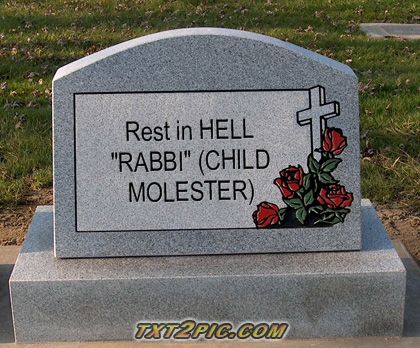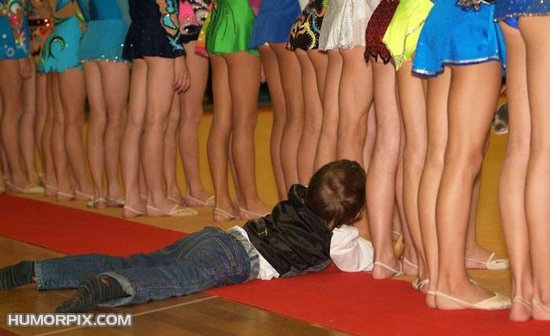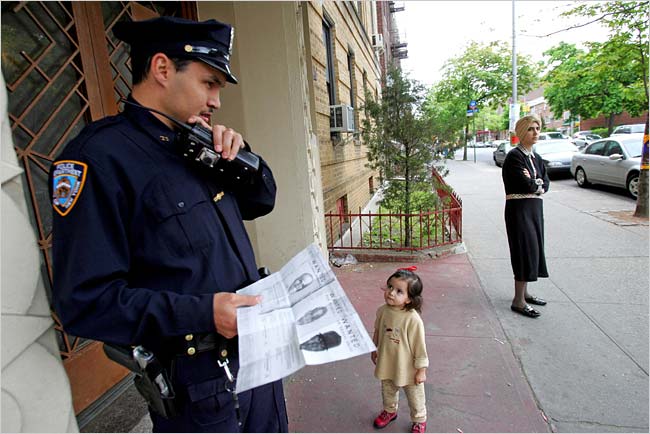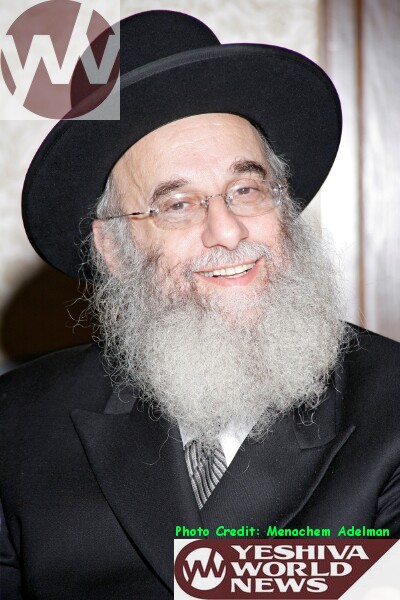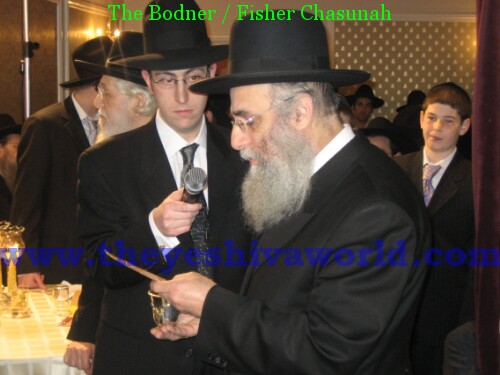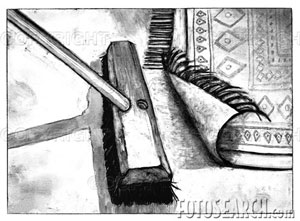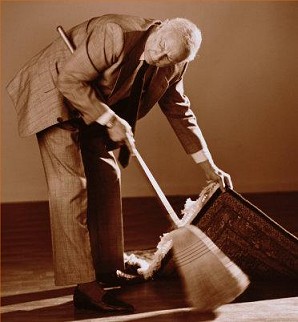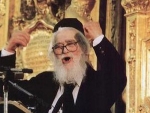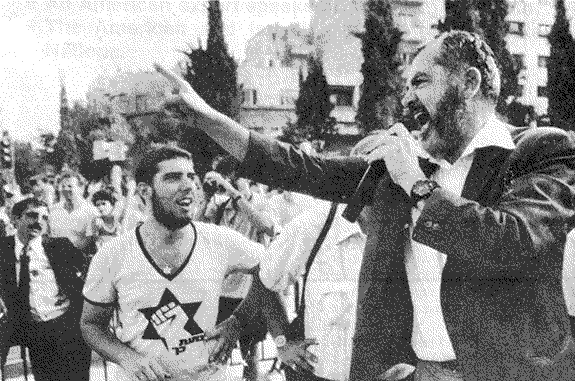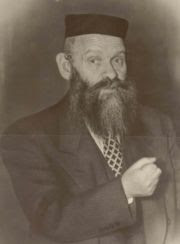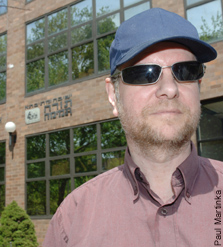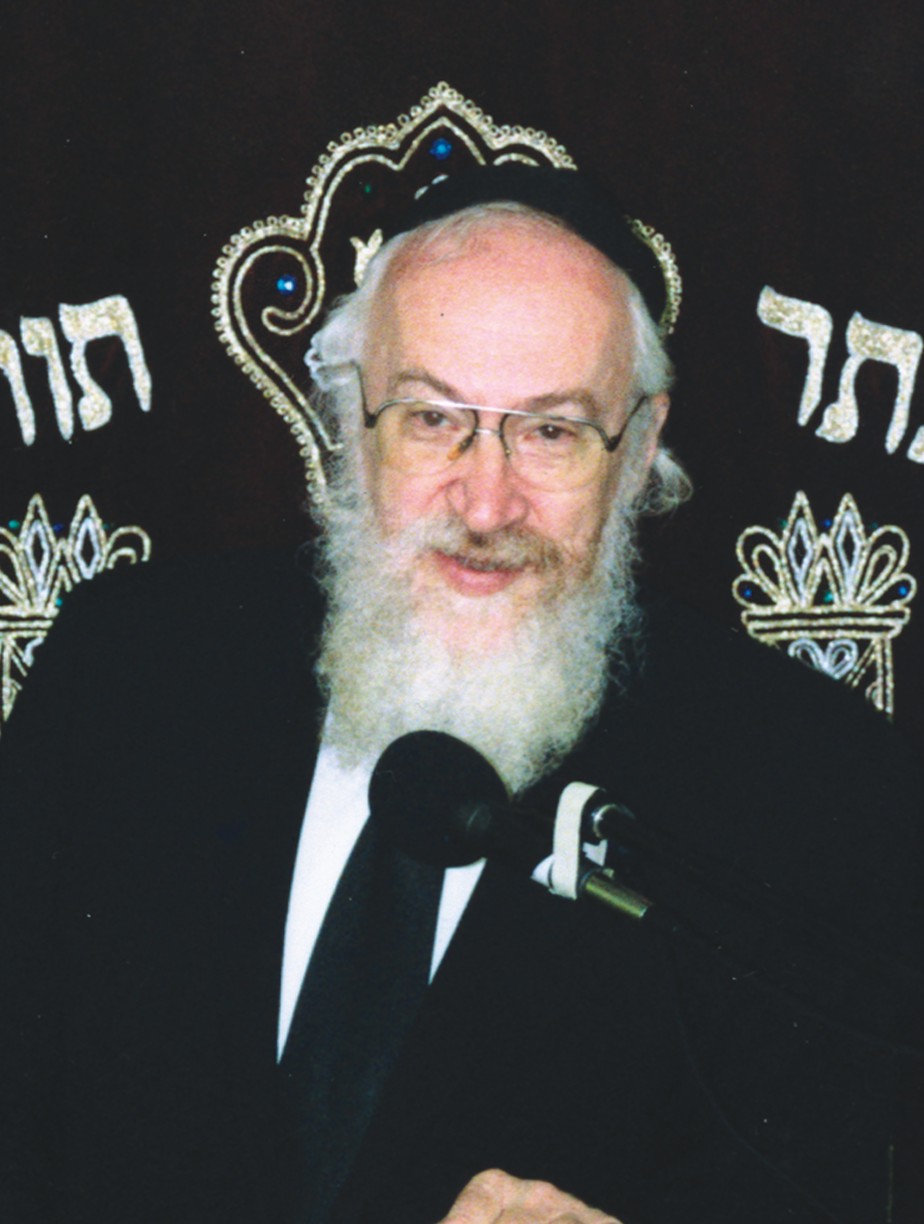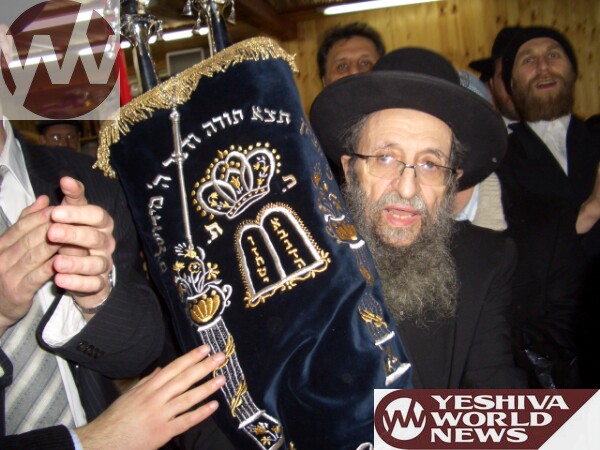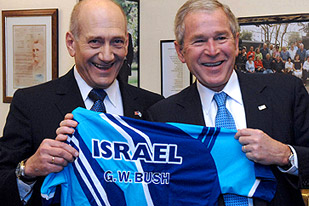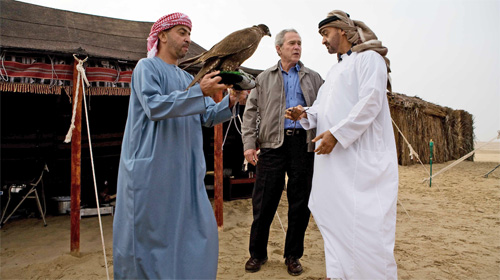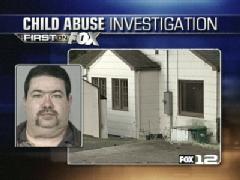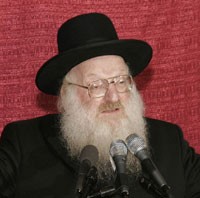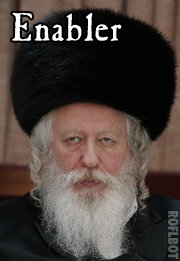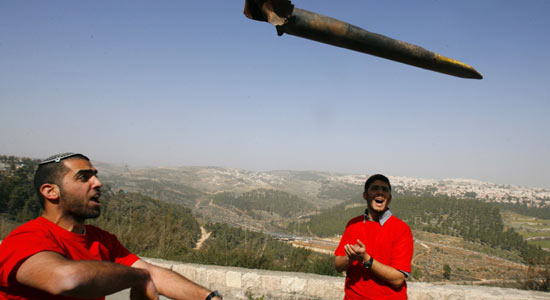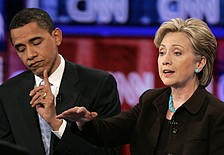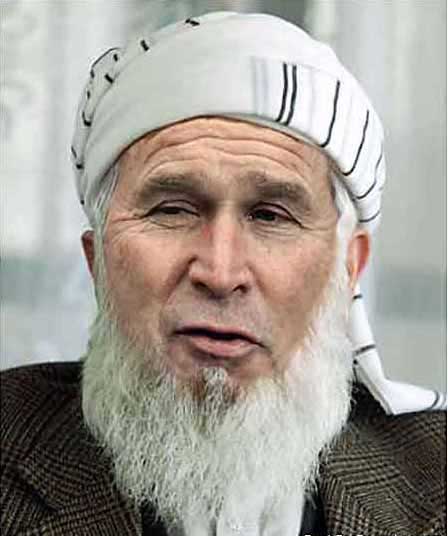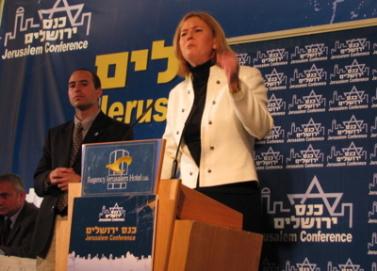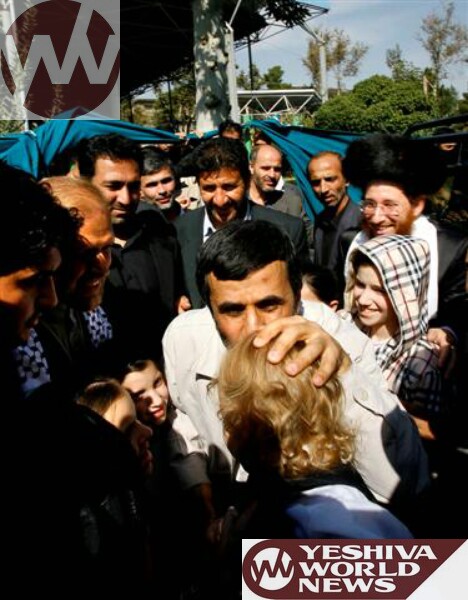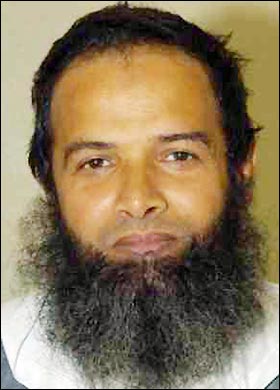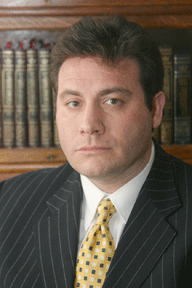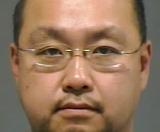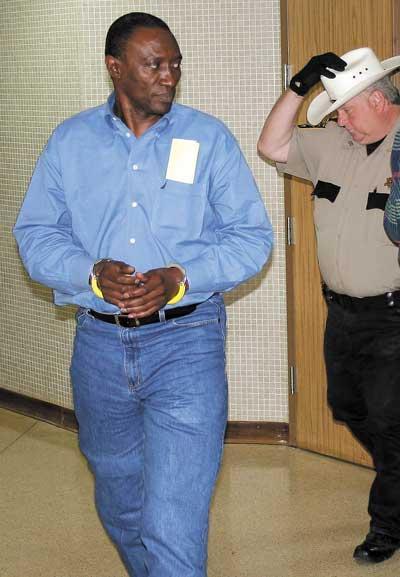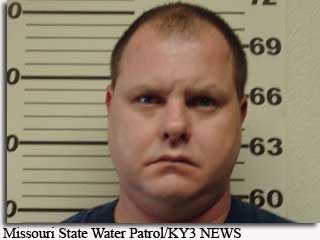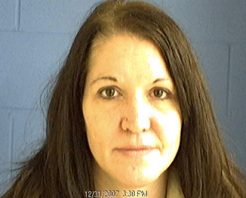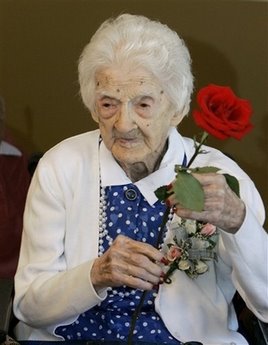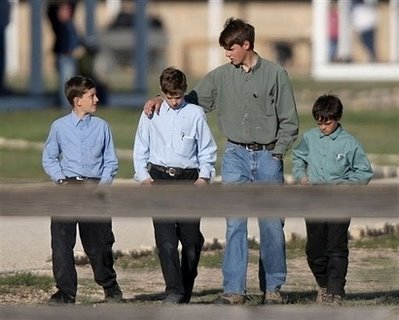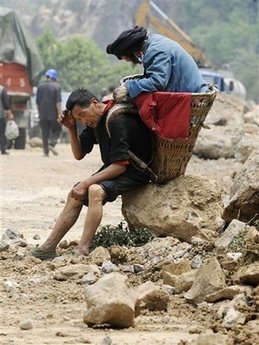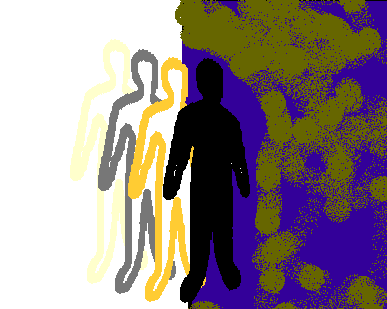Tuesday, June 12, 2012
Tales of Chelm - The Word Of An Elder Is Respected Over The Word Of A Child
http://www.cbsnews.com/8301-501363_162-57450886/orthodox-nyc-counselor-on-trial-in-sex-abuse-case/
Orthodox NYC counselor on trial in sex abuse case
NEW YORK — The abuse went on for nearly three years before the schoolgirl told anyone that her spiritual adviser was molesting her while he was supposed to be mentoring her about her religion, authorities said.
“They imagine they're the wave of the future, but it's only sewage flowing downhill”
Weberman attends fundraiser event for himself in May
But in Brooklyn's ultra-orthodox Jewish community, 53-year-old Nechemya Weberman has been embraced and defended as wrongly accused. The girl has been called a slut and a troublemaker, her family threatened and spat at on the street.
The rallying around Weberman, who goes on trial this month, and ostracizing of his accuser and her family reflects long-held beliefs in this insular community that problems should be dealt with from within and that elders have far more authority than the young. It also brought to light allegations that the district attorney was too cozy with powerful rabbis, a charge he vehemently denies.
"There are other people that claim misconduct and they can't come out because they're going to be re-victimized and ostracized by the community," said Judy Genut, a friend of the accuser's family who counsels troubled girls.
Brooklyn is home to about 250,000 ultra-orthodox Jews, the largest community outside of Israel. Step onto a Williamsburg street and tall guys in skinny jeans and tattoos are mingling with a flush of men in dark coats and hats carrying prayer books and speaking Yiddish. The Hasidic Jews appear to outsiders as though they come from another time; embracing centuries-old traditions, they wear black clothes, tall hats, long beards and earlocks. Women wear long skirts and cover their heads after they marry.
They have their own ambulances and schools, called yeshivas, their own civilian police and rabbinical courts. Members are encouraged to first speak to a rabbi before going to secular authorities — and as a result, cases rarely make it to outside law enforcement.
The topic has been studied and reported in the Jewish media for years and has recently made headlines in New York papers.
"They think that anyone who turns over anyone to the outside authorities is committing a transgression to the community at large," said Samuel Heilman, a professor of Jewish studies at Queens College.
The girl, now 17, was sent to Weberman at age 12 because she'd been asking theological questions and he had a reputation for helping people back on the spiritual path. He often counseled people, though he had no formal training. But during sessions, authorities say, he forced the girl to perform sex acts.
The girl started dressing immodestly, was deemed a troublemaker and removed from her school — one Weberman was affiliated with — and sent to another, family friends said. The allegations surfaced in 2011 when she told a guidance counselor there she'd been molested.
The Associated Press typically doesn't identify people who say they are the victims of sexual assault.
Weberman has pleaded not guilty, and articles in Hasidic newspapers have proclaimed his innocence and begged the community for support. More than 1,000 men showed up for a fundraiser aiming to raise $500,000 for his legal fees and, if he's convicted and jailed, money for his family.
"It's very hard for the town to believe the things that he's being accused of because he has a reputation of doing good and being good," Genut said.
George Farkas, Weberman's lawyer, said his client isn't guilty but is damned regardless because the allegations will taint his reputation.
The family has said they would've preferred to handle the allegations within the community. But when accusations are managed from the inside, victims are rarely believed and abusers aren't punished — in part because the word of an elder is respected over the word of a child, victims and advocates say.
Joel Engelman said he tried to work with yeshiva officials, finally confronting them at age 22 about a rabbi who abused him as a child. Engelman was given a lie detector test and encouraged to keep quiet about the allegations, and the rabbi was temporarily removed — long enough for Engelman to turn 23, making him too old under state law to file a complaint.
"It's that they don't want to believe that the rabbis that they've been raised to respect could be so cruel and could be so criminal," said Engelman, now 26.
His mother, Pearl, herself an activist, said the community is overwhelmingly good and believes people must be educated about the crime to start standing up for the victims.
"I'm not an anarchist, I'm not a rebel," said the 64-year-old mother of seven. "I love this community, and I want to change it for the better and make it safer for children."
Outside law enforcement has also had a difficult time. Before 2009, only a handful of sex abuse cases were reported within the ultra-orthodox community. Then, District Attorney Charles Hynes created a program called Kol Tzedek (Voice of Justice) aimed at helping more victims come forward about abuse, an underreported crime everywhere.
Part of the deal, along with a designated hotline and counseling, is that prosecutors don't actively publicize the names of accused abusers. The cases are still tried in open court, where the names are public.
Before Kol Tzedek, Hynes said, he struggled to mount a successful prosecution. "As soon as we would give the name of a defendant ... (rabbis and others) would engage this community in a relentless search for the victims," he said. "And they're very, very good at identifying the victims. And then the victims would be intimidated and threatened, and the case would fall apart."
Since then, 100 of the total 5,389 cases in the borough have come from the ultra-orthodox community, the district attorney's office said. Hynes also started a taskforce to combat intimidation attempts — and has said rabbis have a duty to come forward if they have been told of abuse.
But victims' rights advocates say Hynes has purposefully ignored some cases and hasn't pushed as strongly for full prosecutions of others — bowing to powerful rabbis in exchange for political support, a charge he strongly denies.
"He doesn't take care of victims," said Nuchem Rosenberg, a rabbi who says he was ostracized for speaking out about abuse. "He takes care of those in power, so they can all keep power."
Genut said the accuser is ready to testify. Her family, though, is looking for a higher judgment than criminal court.
"They believe that God's going to take revenge on him," she said. "They're suffering a lot and they say one nice day God's going to show us that he did stick up for us."
Orthodox NYC counselor on trial in sex abuse case
NEW YORK — The abuse went on for nearly three years before the schoolgirl told anyone that her spiritual adviser was molesting her while he was supposed to be mentoring her about her religion, authorities said.
“They imagine they're the wave of the future, but it's only sewage flowing downhill”
Weberman attends fundraiser event for himself in May
But in Brooklyn's ultra-orthodox Jewish community, 53-year-old Nechemya Weberman has been embraced and defended as wrongly accused. The girl has been called a slut and a troublemaker, her family threatened and spat at on the street.
The rallying around Weberman, who goes on trial this month, and ostracizing of his accuser and her family reflects long-held beliefs in this insular community that problems should be dealt with from within and that elders have far more authority than the young. It also brought to light allegations that the district attorney was too cozy with powerful rabbis, a charge he vehemently denies.
"There are other people that claim misconduct and they can't come out because they're going to be re-victimized and ostracized by the community," said Judy Genut, a friend of the accuser's family who counsels troubled girls.
Brooklyn is home to about 250,000 ultra-orthodox Jews, the largest community outside of Israel. Step onto a Williamsburg street and tall guys in skinny jeans and tattoos are mingling with a flush of men in dark coats and hats carrying prayer books and speaking Yiddish. The Hasidic Jews appear to outsiders as though they come from another time; embracing centuries-old traditions, they wear black clothes, tall hats, long beards and earlocks. Women wear long skirts and cover their heads after they marry.
They have their own ambulances and schools, called yeshivas, their own civilian police and rabbinical courts. Members are encouraged to first speak to a rabbi before going to secular authorities — and as a result, cases rarely make it to outside law enforcement.
The topic has been studied and reported in the Jewish media for years and has recently made headlines in New York papers.
"They think that anyone who turns over anyone to the outside authorities is committing a transgression to the community at large," said Samuel Heilman, a professor of Jewish studies at Queens College.
The girl, now 17, was sent to Weberman at age 12 because she'd been asking theological questions and he had a reputation for helping people back on the spiritual path. He often counseled people, though he had no formal training. But during sessions, authorities say, he forced the girl to perform sex acts.
The girl started dressing immodestly, was deemed a troublemaker and removed from her school — one Weberman was affiliated with — and sent to another, family friends said. The allegations surfaced in 2011 when she told a guidance counselor there she'd been molested.
The Associated Press typically doesn't identify people who say they are the victims of sexual assault.
Weberman has pleaded not guilty, and articles in Hasidic newspapers have proclaimed his innocence and begged the community for support. More than 1,000 men showed up for a fundraiser aiming to raise $500,000 for his legal fees and, if he's convicted and jailed, money for his family.
"It's very hard for the town to believe the things that he's being accused of because he has a reputation of doing good and being good," Genut said.
George Farkas, Weberman's lawyer, said his client isn't guilty but is damned regardless because the allegations will taint his reputation.
The family has said they would've preferred to handle the allegations within the community. But when accusations are managed from the inside, victims are rarely believed and abusers aren't punished — in part because the word of an elder is respected over the word of a child, victims and advocates say.
Joel Engelman said he tried to work with yeshiva officials, finally confronting them at age 22 about a rabbi who abused him as a child. Engelman was given a lie detector test and encouraged to keep quiet about the allegations, and the rabbi was temporarily removed — long enough for Engelman to turn 23, making him too old under state law to file a complaint.
"It's that they don't want to believe that the rabbis that they've been raised to respect could be so cruel and could be so criminal," said Engelman, now 26.
His mother, Pearl, herself an activist, said the community is overwhelmingly good and believes people must be educated about the crime to start standing up for the victims.
"I'm not an anarchist, I'm not a rebel," said the 64-year-old mother of seven. "I love this community, and I want to change it for the better and make it safer for children."
Outside law enforcement has also had a difficult time. Before 2009, only a handful of sex abuse cases were reported within the ultra-orthodox community. Then, District Attorney Charles Hynes created a program called Kol Tzedek (Voice of Justice) aimed at helping more victims come forward about abuse, an underreported crime everywhere.
Part of the deal, along with a designated hotline and counseling, is that prosecutors don't actively publicize the names of accused abusers. The cases are still tried in open court, where the names are public.
Before Kol Tzedek, Hynes said, he struggled to mount a successful prosecution. "As soon as we would give the name of a defendant ... (rabbis and others) would engage this community in a relentless search for the victims," he said. "And they're very, very good at identifying the victims. And then the victims would be intimidated and threatened, and the case would fall apart."
Since then, 100 of the total 5,389 cases in the borough have come from the ultra-orthodox community, the district attorney's office said. Hynes also started a taskforce to combat intimidation attempts — and has said rabbis have a duty to come forward if they have been told of abuse.
But victims' rights advocates say Hynes has purposefully ignored some cases and hasn't pushed as strongly for full prosecutions of others — bowing to powerful rabbis in exchange for political support, a charge he strongly denies.
"He doesn't take care of victims," said Nuchem Rosenberg, a rabbi who says he was ostracized for speaking out about abuse. "He takes care of those in power, so they can all keep power."
Genut said the accuser is ready to testify. Her family, though, is looking for a higher judgment than criminal court.
"They believe that God's going to take revenge on him," she said. "They're suffering a lot and they say one nice day God's going to show us that he did stick up for us."
Thursday, June 07, 2012
Rampant Witness Intimidation In The Ultra-Orthodox Community Forces Establishment Of New Task Force Headed by Chief Of The Brooklyn District Attorney’s Rackets Bureau
http://m.thejewishweek.com/news/new_york/rackets_bureau_chief_vows_openness_witness_intimidation
Michael Vecchione’s comments came Tuesday in an interview with The Jewish Week, and they suggest an openness to receiving information from community members in sex abuse cases that his own boss, DA Charles Hynes — at least based on his recent statements to the press — appears to lack.
In public statements over the course of the past few weeks, Hynes has described the problem of intimidation of Orthodox abuse victims as worse than anything he has seen in organized crime or police corruption cases.
“We should not be limited by what [people in the community] believe intimidation is,” Vecchione said in response to a comment by The Jewish Week that many in the community fear that threats of social ostracism themselves may not be actionable as a form of intimidation.
“[Ostracism] could be [intimidation],” he asserted, noting that “the statute is specific yet broad enough, and there is a catch-all phrase that would get us into that.
“We should be limited by nothing,” Vecchione continued, adding that “[community members] should just bring to us what they have and then we will go from there.”
(Vecchione is apparently no stranger to prosecutions involving the Orthodox community. Indeed, a piece in Monday’s New York Times about a 1994 kidnapping case seems to lend weight to longstanding claims that Hynes has historically treated Orthodox defendants with kid gloves. In that case, according to the Times, Hynes’ office initially sought to drop the case and then entered into a plea deal that was later overturned by a State Supreme Court justice. The prosecutor on that case was Vecchione.)
According to the law, Vecchione explained, if someone “interferes with a prosecution by attempting to have a witness absent themselves or change their testimony” then that person is “guilty of one of the crimes that fits into the category of intimidating a witness.”
Asked whether rabbis, like David Zwiebel, the executive vice president of the haredi umbrella group Agudath Israel, who contend that reporting to the authorities before first consulting a rabbi is mesirah (the act of informing) — an action punishable by death — could themselves be committing a crime, Vecchione said that “[they] could, depending upon what the person who is making the statements is talking about and to [whom].”
According to Vecchione, this hinges on whether the person is speaking generally or whether the “intimidating statement” can be connected to “a particular case … in which a person decides not to come forward or change their testimony or something of that nature.”
“There has to be a connection between what the potential defendant and/or intimidator says and the witness in a particular case,” he continued, noting that this could be “very difficult” to establish.
Hynes himself has said that he would not take action regarding such statements, but for a different reason. Responding to a question posed by radio host Zev Brenner Monday night about whether a rabbi who says reporting is mesirah can be prosecuted, Hynes said that “no legal authority ... allows me to object to [such statements] … because they are a religious interpretation.”
Some experts disagree with both Hynes and Vecchione. According to James A. Cohen, a professor at Fordham Law School and an expert in the area of witness tampering, “A [general], public statement is obstruction. In this country we respect religion … but that doesn’t give [religious leaders] license to stand at the pulpit and say ‘you must consult with a religious figure … before you go to the authorities.’ This is obstruction of justice, plain and simple.”
Marci Hamilton, the Paul R. Verkuil chair in public law at Cardozo School of Law, concurs.
“Where Hynes gets it wrong is that he cannot prosecute someone for the content or viewpoint of their speech, but he can prosecute them for inciting imminent lawless action.
“Where the rabbis are inciting their congregations to obstruct justice or endanger children,” Hamilton explained, “they are crossing the line from protected speech to illegal conduct.”
Vecchione also allowed that such statements might be viewed as an interference with community members’ civil rights — a theory that has been advanced by Orthodox attorney and author Michael Lesher. But the rackets bureau chief added that “you have to ask the federal authorities about that because … I don’t want to speak to that because I’m not familiar with the law.”
Lesher has noted “under federal law, it is a crime to use the threat of force to interfere with someone’s right to the benefits of state law, including the criminal justice system, if you make that threat because of the victim’s religion.”
“By invoking the language of mesirah — a religious offense that authorizes the use of deadly force against any Jew who ‘informs’ to the authorities — Agudah’s stated policy amounts to a deliberate call for the use of force to stop a Jew, because he or she is a Jew, from going to police against a rabbi’s instructions,” Lesher told The Jewish Week. This could make the Agudah and anyone else making such statements “complicit in a civil rights crime any time an Orthodox Jew gets a threat for talking to the police when a rabbi told him not to,” Lesher believes.
Vecchione also said that the DA’s task force might consider convening an investigative grand jury to gather information without a particular target, something that he — and Cohen, among others — have acknowledged is “a very powerful tool in terms of investigating organized crime.”
“The techniques that we use to investigate organized crime can very well be used in this situation as well,” he added.
Vecchione’s statements stand in contrast to those made recently by Hynes about those who have attempted to bring to his office information about intimidation.
Late last month, The Jewish Week reported that a father whose son was allegedly molested by Rabbi Yehuda Kolko provided information both to the police and, in an affidavit, the DA about a harassing phone call he received originating — according to the caller ID on his phone — from the school, Yeshiva Torah Temimah, where the alleged abuse occurred and which the father is now suing. (The same family pressed criminal charges against Rabbi Kolko, who was allowed to plead to misdemeanor charges of endangering the welfare of a child. Rabbi Kolko is now awaiting trial on charges he violated an order of protection that was part of the plea deal.)
In response to a question from WCBS at a recent, unrelated press conference, Hynes seemed to minimize the father’s claims, saying that he “was the victim of a telephone hang up” from “something called Torah Termina [sic] on Ocean Parkway” and that the affidavit he submitted charged “no criminality.” However, Cohen told The Jewish Week several weeks ago that “threatening phone calls” — even outside the context of a criminal or civil action — “is criminal conduct.”
The DA also appeared to cast doubt on the father’s report that the call came from the school, saying that he wished “we had that technology [that the father had] because we have one hell of a time tracing phone calls” and went on to ask, “How do we find the person that made that phone call?”
While the father acknowledges that identifying the exact person who made the call from the school’s number could be difficult or even impossible, he also noted in an interview with The Jewish Week that his phone company informed him that it would release his phone records if ordered to do so by the police or the courts. He also contends that he was given no indication that the DA or the police even investigated the claims made in his police report (which he also shared with The Jewish Week) and could not in fact get anyone from the office to return his calls for months, until after a reporter from the New York Post started making inquiries.
The district attorney also declined to meet with victims’ advocate and psychologist Dr. Asher Lipner, who requested through former Mayor Ed Koch a meeting “to share ideas and information” with the DA’s task force through (Lipner has been treating survivors of child sexual abuse in Brooklyn’s Orthodox community for over a decade).
The Jewish Week has obtained a copy of an e-mail sent by Dr. Lipner to members of the DA’s Kol Tzedek staff about the information discussed in those meetings (one of which included advocate Ben Hirsch of Survivors for Justice, and was referenced in a separate e-mail). This information included allegations of witness tampering and obstruction by named rabbis and community-based organizations. Lipner was apparently told that these staff members would be putting an assistant district attorney from the rackets bureau in touch with him, but this never materialized, according to Lipner.
However, if Vecchione’s statements are any indication, Lipner may well get another chance.
“Tell people that they have someone they can come to,” Vecchione instructed The Jewish Week. “And that our rackets division is open for business.”
Rackets Bureau Chief Vows Openness On Witness Intimidation
Vecchione, part of new DA task force, says ‘we should be limited by nothing’ in fight against community pressure in abuse cases.
Wednesday, June 6, 2012
Hella Winston
Special To The Jewish Week
The chief of the Brooklyn district attorney’s rackets bureau and a
member of the DA’s new task force to combat witness intimidation in the
ultra-Orthodox community indicated a willingness to explore all
available avenues to tamp down on the problem — including “[picking] up
the phone and [calling] the U.S. attorney.”Michael Vecchione’s comments came Tuesday in an interview with The Jewish Week, and they suggest an openness to receiving information from community members in sex abuse cases that his own boss, DA Charles Hynes — at least based on his recent statements to the press — appears to lack.
In public statements over the course of the past few weeks, Hynes has described the problem of intimidation of Orthodox abuse victims as worse than anything he has seen in organized crime or police corruption cases.
“We should not be limited by what [people in the community] believe intimidation is,” Vecchione said in response to a comment by The Jewish Week that many in the community fear that threats of social ostracism themselves may not be actionable as a form of intimidation.
“[Ostracism] could be [intimidation],” he asserted, noting that “the statute is specific yet broad enough, and there is a catch-all phrase that would get us into that.
“We should be limited by nothing,” Vecchione continued, adding that “[community members] should just bring to us what they have and then we will go from there.”
(Vecchione is apparently no stranger to prosecutions involving the Orthodox community. Indeed, a piece in Monday’s New York Times about a 1994 kidnapping case seems to lend weight to longstanding claims that Hynes has historically treated Orthodox defendants with kid gloves. In that case, according to the Times, Hynes’ office initially sought to drop the case and then entered into a plea deal that was later overturned by a State Supreme Court justice. The prosecutor on that case was Vecchione.)
According to the law, Vecchione explained, if someone “interferes with a prosecution by attempting to have a witness absent themselves or change their testimony” then that person is “guilty of one of the crimes that fits into the category of intimidating a witness.”
Asked whether rabbis, like David Zwiebel, the executive vice president of the haredi umbrella group Agudath Israel, who contend that reporting to the authorities before first consulting a rabbi is mesirah (the act of informing) — an action punishable by death — could themselves be committing a crime, Vecchione said that “[they] could, depending upon what the person who is making the statements is talking about and to [whom].”
According to Vecchione, this hinges on whether the person is speaking generally or whether the “intimidating statement” can be connected to “a particular case … in which a person decides not to come forward or change their testimony or something of that nature.”
“There has to be a connection between what the potential defendant and/or intimidator says and the witness in a particular case,” he continued, noting that this could be “very difficult” to establish.
Hynes himself has said that he would not take action regarding such statements, but for a different reason. Responding to a question posed by radio host Zev Brenner Monday night about whether a rabbi who says reporting is mesirah can be prosecuted, Hynes said that “no legal authority ... allows me to object to [such statements] … because they are a religious interpretation.”
Some experts disagree with both Hynes and Vecchione. According to James A. Cohen, a professor at Fordham Law School and an expert in the area of witness tampering, “A [general], public statement is obstruction. In this country we respect religion … but that doesn’t give [religious leaders] license to stand at the pulpit and say ‘you must consult with a religious figure … before you go to the authorities.’ This is obstruction of justice, plain and simple.”
Marci Hamilton, the Paul R. Verkuil chair in public law at Cardozo School of Law, concurs.
“Where Hynes gets it wrong is that he cannot prosecute someone for the content or viewpoint of their speech, but he can prosecute them for inciting imminent lawless action.
“Where the rabbis are inciting their congregations to obstruct justice or endanger children,” Hamilton explained, “they are crossing the line from protected speech to illegal conduct.”
Vecchione also allowed that such statements might be viewed as an interference with community members’ civil rights — a theory that has been advanced by Orthodox attorney and author Michael Lesher. But the rackets bureau chief added that “you have to ask the federal authorities about that because … I don’t want to speak to that because I’m not familiar with the law.”
Lesher has noted “under federal law, it is a crime to use the threat of force to interfere with someone’s right to the benefits of state law, including the criminal justice system, if you make that threat because of the victim’s religion.”
“By invoking the language of mesirah — a religious offense that authorizes the use of deadly force against any Jew who ‘informs’ to the authorities — Agudah’s stated policy amounts to a deliberate call for the use of force to stop a Jew, because he or she is a Jew, from going to police against a rabbi’s instructions,” Lesher told The Jewish Week. This could make the Agudah and anyone else making such statements “complicit in a civil rights crime any time an Orthodox Jew gets a threat for talking to the police when a rabbi told him not to,” Lesher believes.
Vecchione also said that the DA’s task force might consider convening an investigative grand jury to gather information without a particular target, something that he — and Cohen, among others — have acknowledged is “a very powerful tool in terms of investigating organized crime.”
“The techniques that we use to investigate organized crime can very well be used in this situation as well,” he added.
Vecchione’s statements stand in contrast to those made recently by Hynes about those who have attempted to bring to his office information about intimidation.
Late last month, The Jewish Week reported that a father whose son was allegedly molested by Rabbi Yehuda Kolko provided information both to the police and, in an affidavit, the DA about a harassing phone call he received originating — according to the caller ID on his phone — from the school, Yeshiva Torah Temimah, where the alleged abuse occurred and which the father is now suing. (The same family pressed criminal charges against Rabbi Kolko, who was allowed to plead to misdemeanor charges of endangering the welfare of a child. Rabbi Kolko is now awaiting trial on charges he violated an order of protection that was part of the plea deal.)
In response to a question from WCBS at a recent, unrelated press conference, Hynes seemed to minimize the father’s claims, saying that he “was the victim of a telephone hang up” from “something called Torah Termina [sic] on Ocean Parkway” and that the affidavit he submitted charged “no criminality.” However, Cohen told The Jewish Week several weeks ago that “threatening phone calls” — even outside the context of a criminal or civil action — “is criminal conduct.”
The DA also appeared to cast doubt on the father’s report that the call came from the school, saying that he wished “we had that technology [that the father had] because we have one hell of a time tracing phone calls” and went on to ask, “How do we find the person that made that phone call?”
While the father acknowledges that identifying the exact person who made the call from the school’s number could be difficult or even impossible, he also noted in an interview with The Jewish Week that his phone company informed him that it would release his phone records if ordered to do so by the police or the courts. He also contends that he was given no indication that the DA or the police even investigated the claims made in his police report (which he also shared with The Jewish Week) and could not in fact get anyone from the office to return his calls for months, until after a reporter from the New York Post started making inquiries.
The district attorney also declined to meet with victims’ advocate and psychologist Dr. Asher Lipner, who requested through former Mayor Ed Koch a meeting “to share ideas and information” with the DA’s task force through (Lipner has been treating survivors of child sexual abuse in Brooklyn’s Orthodox community for over a decade).
The Jewish Week has obtained a copy of an e-mail sent by Dr. Lipner to members of the DA’s Kol Tzedek staff about the information discussed in those meetings (one of which included advocate Ben Hirsch of Survivors for Justice, and was referenced in a separate e-mail). This information included allegations of witness tampering and obstruction by named rabbis and community-based organizations. Lipner was apparently told that these staff members would be putting an assistant district attorney from the rackets bureau in touch with him, but this never materialized, according to Lipner.
However, if Vecchione’s statements are any indication, Lipner may well get another chance.
“Tell people that they have someone they can come to,” Vecchione instructed The Jewish Week. “And that our rackets division is open for business.”
Saturday, June 02, 2012
BREAKING NEWS!!! Yeshiva Of Brooklyn Being Investigated For Child Sex Abuse/Coverup - VICTIM (SURVIVOR) SPEAKS OUT!!! WPIX (CHANNEL 11) WATCH VIDEO
BROOKLYN, NY (PIX11)—
The family of a Brooklyn man being treated for drug
addiction in California traces his problems back to sexual abuse by a
yeshiva teacher, when he was just 9 years old.
"I do recall the rabbi being over here, trying to hush up my dad," Yosef
Werner--the abuse survivor's brother--told PIX 11 Friday.20 years ago, Daniel "Benji" Werner came home from the Yeshiva of Brooklyn one day and started confiding in his mother at their Midwood home. "He told me the rabbi was touching him," Yehudis Werner told PIX. "And I said, 'What??!!"
Benji Werner told his mother the teacher would call him up to the front of the class, take the boy behind the desk, place Benji on his lap, and then put his hands in the boy's pants and molest him.
Mrs. Werner said she called her husband, Aaron, and he started contacting other parents from Benji's class. She told PIX several parents had heard the same thing from their children. Soon after, she said the family received calls from religious leaders. "They called up my husband and said 'if you continue to call parents, we'll make your name mud.'"
Yehudis Werner told PIX that because the family with eight children had recently emigrated to Brooklyn from Israel, they didn't want to rock the boat back then by going to police.
The Werner family decided to talk to PIX 11 now, because of recent publicity surrounding the District Attorney's office and how it's handled sexual abuse cases in the Orthodox Jewish community. The Kings Country District Attorney, Charles Hynes, told reporters this week he's ready to put handcuffs on any religious leader who threatens witnesses in the ultra-Orthodox neighborhoods.
Back in 1992, Benji Werner's parents took him out of the yeshiva and transferred him to a school on the lower East Side of Manhattan. But within a couple of years, Yosef Werner recalls his kid brother was getting into trouble, at the age of 11. "I know he was popping Ecstasy pills at a very early stage," Yosef Werner told PIX.
From rehab in California, Benji Werner told PIX 11 by phone Friday, "I basically isolated myself. I was depressed. After two years in my new school, one of the kids introduced me to marijuana. I smoked it and it would deaden my feelings." Werner acknowledged he later took Ecstasy and acid.
Through tears, Benji Werner's mother told PIX, "My only regret? I wish I got him counseling at the time." She told PIX her son tells her not to feel so badly. "He said, 'At least you did better than other parents. You put me in a new school.'" Yehudis Werner said she recently told her son, "Benji, thank you for confiding in me."
When PIX 11 contacted Yeshiva of Brooklyn Friday, a man who answered the phone said he was the principal. When I identified myself and asked if Benji's rabbi was still working at the yeshiva, the man told me, "No, he is no longer here." When I asked why, he responded, "None of your business. This is a private school."
Six years ago, Benji Werner and his brother paid a visit to the Kings County District Attorney's office. But Benji Werner was already 24 years old, so too much time had passed; under state law, there could be no prosecution, because of the statute of limitations.
Yosef Werner, a teacher, said he was working with a liason in the Orthodox Jewish community to get an apology from Benji's old teacher. But it never happened. "I did get a bottle of Chivas Regal from this individual who was trying to bribe me to shut my mouth up," Werner said.
Werner's father, Aaron, is dead now, and Yosef Werner said Friday, "I want people to see this story, because my father wanted this to come out in the 1990's."
When PIX 11 asked Benji Werner if he will get over his trauma, he replied, "Yes, I will, because I'm talking about it now. For years, I didn't talk."
Benji Werner expects to be in rehab for at least another, three months.
Watch video and read article: http://www.wpix.com/news/wpix-new-york-orthodox-sex-abuse-case,0,5559513.story
Failed Messiah: http://failedmessiah.typepad.com/failed_messiahcom/2012/06/molested-in-the-yeshiva-of-brooklyn-789.html#comments
Wednesday, July 13, 2011
What's In The Mind Of A Child Killer?
By Sheila Anne Feeney

It’s possible that Levi Aron, 35, the Kensington man accused of killing 8-year-old Leiby Kletzky, might be severely mentally ill or have a personality disorder. But “most of us gravitate to thinking that this fellow was a pedophile,” who allegedly killed the child for sexual excitement or to prevent him from telling anyone about a sexual assault, said N.G. Berrill, director of New York Forensic, a behavioral science consultant group.
Aron reportedly told cops he killed the boy in a panic, but that explanation didn’t wash with experts.
“That’s an after-the-fact statement offenders make,” to obscure actual motives, said Stanton Samenow, author of “Inside the Criminal Mind.” “There may have been sexual interest and there are very high odds there was sexual contact,” Samenow said.
Sometimes “there is sexual gratification in the dismemberment itself,” added Louis Schlesinger, a professor of forensic psychology at John Jay College and author of “Sexual Murder: Catathymic and Compulsive Homicide.”
The boy’s feet may have been kept as some sort of “trophy” or “prize,” possibly to be used for sexual gratification at a later time, Berrill added.
Rarely do such crimes occur out of the blue, nor are they out of character, said Samenow. While little is known at this point about the suspect, Samenow said that forensic investigations usually reveal a history of atypical, antisocial behaviors which may include deviant sexual interests, an extensive fantasy life, the need to control others, an inability to get along with peers or to respond in a constructive way to life’s challenges, and a track record of intimidating, deceptive, and even violent behavior.
Aron may have been abused himself, added Berrill, explaining that for some victims, committing violent acts is a way for them to “relive the experience” of their own childhoods but in the role of the aggressor.
But no history of abuse can justify the murder of an innocent child.
“People who commit terrible crimes come from all walks of life. It’s not the environment that makes them violent, but the way they respond and the way they think,” Samenow said. “Typically, these people who have a brother or sister who grew up in the same environment, but who do not rush out and kill eight-year-olds,” he added.
The Kletzky murder rivets the attention of all New York in part because stranger abductions of children are “enormously, enormously rare,” in the words of Schlesinger. And they are almost inconceivable in the Orthodox community, which is believed by researchers to have lower rates of substance abuse and violence than society at large.
Parents need not put their children on lock-down out of fear for their safety, Schlesinger stressed, noting the Casey Anthony case is more representative of most child murders.
“The typical person who kills a child is the child’s mother, father, step father or another member of the family,” Schlesinger said.
=========================================================================

What's in the mind of a child killer?
Photo credit: amNY
What on earth could compel a man to kill and chop up a little boy, keeping the child's dismembered feet in his refrigerator?It’s possible that Levi Aron, 35, the Kensington man accused of killing 8-year-old Leiby Kletzky, might be severely mentally ill or have a personality disorder. But “most of us gravitate to thinking that this fellow was a pedophile,” who allegedly killed the child for sexual excitement or to prevent him from telling anyone about a sexual assault, said N.G. Berrill, director of New York Forensic, a behavioral science consultant group.
Aron reportedly told cops he killed the boy in a panic, but that explanation didn’t wash with experts.
“That’s an after-the-fact statement offenders make,” to obscure actual motives, said Stanton Samenow, author of “Inside the Criminal Mind.” “There may have been sexual interest and there are very high odds there was sexual contact,” Samenow said.
Sometimes “there is sexual gratification in the dismemberment itself,” added Louis Schlesinger, a professor of forensic psychology at John Jay College and author of “Sexual Murder: Catathymic and Compulsive Homicide.”
The boy’s feet may have been kept as some sort of “trophy” or “prize,” possibly to be used for sexual gratification at a later time, Berrill added.
Rarely do such crimes occur out of the blue, nor are they out of character, said Samenow. While little is known at this point about the suspect, Samenow said that forensic investigations usually reveal a history of atypical, antisocial behaviors which may include deviant sexual interests, an extensive fantasy life, the need to control others, an inability to get along with peers or to respond in a constructive way to life’s challenges, and a track record of intimidating, deceptive, and even violent behavior.
Aron may have been abused himself, added Berrill, explaining that for some victims, committing violent acts is a way for them to “relive the experience” of their own childhoods but in the role of the aggressor.
But no history of abuse can justify the murder of an innocent child.
“People who commit terrible crimes come from all walks of life. It’s not the environment that makes them violent, but the way they respond and the way they think,” Samenow said. “Typically, these people who have a brother or sister who grew up in the same environment, but who do not rush out and kill eight-year-olds,” he added.
The Kletzky murder rivets the attention of all New York in part because stranger abductions of children are “enormously, enormously rare,” in the words of Schlesinger. And they are almost inconceivable in the Orthodox community, which is believed by researchers to have lower rates of substance abuse and violence than society at large.
Parents need not put their children on lock-down out of fear for their safety, Schlesinger stressed, noting the Casey Anthony case is more representative of most child murders.
“The typical person who kills a child is the child’s mother, father, step father or another member of the family,” Schlesinger said.
=========================================================================
The Accused Killer in His Own Words
Read a partial transcript of the confession that police say Levi Aron gave during questioning
This transcript has been edited to remove parts of an extremely graphic nature. It has not been edited for clarity. These are the suspect's words as written on a legal pad during questioning, according to law enforcement sources.
My name is Levi Aron... On Monday evening around 5:30 I went to my dentist, Dr. Sorcher, to make a payment for visit for exam routine.
A boy approached me on where the Judaica book store was. He was still there when went out from the dentist’s office. He asked me for a ride to the Judaica book store. While on the way he changed his mind and wasn’t sure where he wanted to go.
So I asked if he wanted to go for the ride -- wedding in Monsey -- since I didn’t think I was going to stay for the whole thing since my back was hurting. He said ok.
Due to traffic, I got back around 11:30 p.m. … so I brought him to my house thinking I’d bring him to his house the next day. He watched TV then fell asleep in the front room. I went to the middle room to sleep. That next morning, he was still sleeping when I was ready to leave.
So I woke him and told him I’ll bring him to his house… when I saw the flyers I panicked and was afraid. When I got home he was still there so I made him a tuna sandwich....
Afterwards -- I panicked because I didn’t know what to do with the body.… carried parts to the back room placing parts between the freezer and the refrigerator …
… went to clean up a little then took a second shower. I panicked and .. Then putting the parts in a suitcase. Then carrying suitcase to the car …placing in backseat on floor behind passenger side.
… drove around approximately around 20 minutes before placing it in the dumpster on 20th street just before 4th Avenue. Then went home to clean and organize.
I understand this may be wrong and I’m sorry for the hurt that I have caused.
Monday, July 04, 2011
Belzer Child Molester Mendel (Menachem) Deutsch Case
Coalition Against Legal Abuse in New York reports:
Last week Wednesday, two boys were molested within an hour of each other, inside the Belzer Synagogue in Boro Park on 15th Avenue. On Erev Shabbos, the NY Post published the news about the sexual attack on two young boys. Detailing how the pedophile lured the boys, aged 11 and 12 into the basement of the shul. Soon after, CALA learned that the surveillance footage was subpoenaed to assist the investigation.
Mi KeAmcha Yisroel! Only three weeks ago, CALA wrote about the Belz Chassidim, how they made the news on their heroic stance on sexual abuse and the steps they have taken for prevention, including surveillance and bathroom monitors. Additionally, their one-strike-and you’re-out policy has helped this investigation come to a swift end.
At around 4:30 pm, the suspect turned himself in to the 66th precinct, accompanied by one of the Belzer Dayanim, and a criminal defense attorney. Again, Belz has taken a strong stance on reporting abuse and putting an end to these types of crimes. It is admirable that a dayan, upon learning the identity of the pedophile from the surveillance footage, actually turned him in, despite the rebbish lineage of the suspect. Kol Hakavod!
The 19 year old suspect, named Menachem Deutsch, is called Mendel amongst his fellow Belzers, and lives near the 15th Avenue Shul where the attack took place. Married for less than a year, he is one of the first grandchildren from the prominent Deutsch family to marry. Originally from Monsey, New York, he married in to a choshiva Belzer Family. His wife is a Schiff from home, a granddaughter of the “Shotz” Moskowitz family, the first grandchild to be married in that family.
Hashem should continue to protect our children and send continued strength and wisdom to the leaders of our community. May they continue to do the right thing.
The question remains: Will he now admit who molested him? Apparently, the family of the first victim already withdrew the charges.
NY Post Update: Brooklyn Teen Surrenders in Abuse Case
Last week Wednesday, two boys were molested within an hour of each other, inside the Belzer Synagogue in Boro Park on 15th Avenue. On Erev Shabbos, the NY Post published the news about the sexual attack on two young boys. Detailing how the pedophile lured the boys, aged 11 and 12 into the basement of the shul. Soon after, CALA learned that the surveillance footage was subpoenaed to assist the investigation.
Mi KeAmcha Yisroel! Only three weeks ago, CALA wrote about the Belz Chassidim, how they made the news on their heroic stance on sexual abuse and the steps they have taken for prevention, including surveillance and bathroom monitors. Additionally, their one-strike-and you’re-out policy has helped this investigation come to a swift end.
At around 4:30 pm, the suspect turned himself in to the 66th precinct, accompanied by one of the Belzer Dayanim, and a criminal defense attorney. Again, Belz has taken a strong stance on reporting abuse and putting an end to these types of crimes. It is admirable that a dayan, upon learning the identity of the pedophile from the surveillance footage, actually turned him in, despite the rebbish lineage of the suspect. Kol Hakavod!
The 19 year old suspect, named Menachem Deutsch, is called Mendel amongst his fellow Belzers, and lives near the 15th Avenue Shul where the attack took place. Married for less than a year, he is one of the first grandchildren from the prominent Deutsch family to marry. Originally from Monsey, New York, he married in to a choshiva Belzer Family. His wife is a Schiff from home, a granddaughter of the “Shotz” Moskowitz family, the first grandchild to be married in that family.
Hashem should continue to protect our children and send continued strength and wisdom to the leaders of our community. May they continue to do the right thing.
The question remains: Will he now admit who molested him? Apparently, the family of the first victim already withdrew the charges.
NY Post Update: Brooklyn Teen Surrenders in Abuse Case
Monday, May 02, 2011
Sex Scandals In Religion Will Be Defeated Just Like The Killing Of Osama bin Laden
The New York State Police at Monroe announce the arrest of: JOSEPH GELBMAN, age 52, 191 Gibber Road, Kiamesha Lake, N ew York, 12751. GELBMAN was charged with Sexual Abuse 3rd degree, Forcible Touching and Endangering the Welfare of a Child, all misdemeanors. The investigation revealed that on Thursday, April 14, 2011, GELBMAN drove a fourteen (14) year old male to the America
’s Best Value Inn located in the Town of Woodbury and had sexual contact with the victim.
=======================================================================
| Vision TV To Air 4-part Series SEX SCANDAL IN RELIGION | |
The spirit is willing, but the flesh is weak. The saying may be New Testament, but – as detailed in a provocative four-part Cogent/Benger TV series - sexual betrayal by spiritual leaders is not confined to any Church, Temple or Mosque. The original series Sex Scandals In Religion offers viewers an unprecedented look at misbehavior manifested in four religions. The four half-hour episodes - produced by Toronto based Cogent/Benger Productions Inc. - take an intimate, compelling and emotional look at the dark secrets that lurk inside houses of the spirit. Sex Scandals In Religion looks beyond the infamous and well-publicized sex abuse scandals in the Catholic Church to stunning stories of sexual misfeasance in four other world religions. In Buddhism, a world-renowned Rinpoche is accused by several women of sexual exploitation; in Islam, the actions of zealots leads to the religiously justified rape of students and gays; in Orthodox Jewry, the mechanisms of justice are obscured in case involving a rabbi and young boys; and in Christian Evangelism, a homophobic black bishop in Atlanta is accused of the serial molestation of fatherless boys. Sex Scandals In Religion will air on consecutive Mondays, beginning with episode 1 In The Name of the Ayatollah May 9 at 10:30 p.m. ET/PT on Vision TV. Episode 1: In The Name of The Ayatollah Directed by Robin Benger The Mullahs of Iran authorize and justify the rape and sodomy of dissidents. State agents of this Islamic country have used the Holy Koran to violently enforce the authority of Clerics over the bodies and souls of all those who dare disagree with their singular vision of the road to Paradise. From refugee havens in Turkey, the victims seek justice. Episode 2: Wall Of Silence Directed by Alan Mendelsohn Deep within a reclusive orthodox Jewish community rests a horrific scandal. A shocked Brooklyn community shields an accused pedophile, as if the accusation itself has broken a covenant. The believers believe that speaking of the evil is worse than the evil itself. Pain, suffering, humiliation and recrimination is the price they pay for this tenet. Episode 3: In The Name Of Enlightenment Directed by Debi Goodwin A Buddhist Master beloved by millions uses his position and authority to take advantage of young women. For over three decades, complaints are dismissed as the grumblings of the uninitiated. A Guru focused on his own pleasure turns the path to enlightenment into the road to sexual servitude. Episode 4: In The Name Of The Lord Directed by Peter Findlay In the Deep South of America, a charismatic preacher rallies the nation against the evils of homosexuality - but this Leader of the Flock coaches fatherless young men with questionable intent. Supporters dismiss the allegations of impropriety and shun the victims. The stain of accusation and lawsuits follow God’s preacher in this examination of power, persuasion and corrupted scripture. Sex Scandals in Religion is Produced by Christopher Sumpton and Robin Benger. Directors include Alan Mendelsohn, Robin Benger, Debi Goodwin, and Peter Findlay. About Cogent/Benger Productions Cogent/Benger Productions Inc. has been producing high-profile network documentaries and specials since 1998. The company has a reputation for producing films destined for a wide public that explore major social issues. | |
Sunday, March 27, 2011
Survivors and Friends
Survivors and Friends is a non-profit organization that was founded by annie, a Survivor of sexual abuse herself. Survivors and Friends exists to provide hope, encouragement, and support for survivors of sexual abuse, incest, and rape, and their friends and family.
Here you will find articles on sexual abuse, incest, rape, and on abuse recovery, which are written by other Survivors or the loved ones of Survivors. You will also find the Survivor's Community--a place where you can safely (and anonymously) talk with other Survivors who may have faced some of the same trials that you may be facing--or have faced in the past. We have forums for partners and parents of survivors as well. We hope that you will find this site helpful in the recovery process.
In the future, we hope to also provide some chat rooms for you to communicate with each other.
Remember, you are not alone.
==========================================================================
Dancing in the Shadows by Laura Bryannan
Chapter 1
SURVIVOR "CHECKLIST"
Did you know that many incest and sexual abuse survivors are not aware they were abused? The psyche effectively blocks the trauma from the conscious mind so the person can continue to move forward and function in life. However, the trauma is never completely erased from a survivor's experience. Some survivors who have no conscious memories of abuse have always had a feeling something happened to them but, because they can't remember anything specific, they tell themselves the feeling must be wrong. If you are one of these people, there is a good chance that you are right-- something did happen to you, even if you can't remember exactly what. So, don't let the fact that you have no solid memories or "movies" keep you from exploring this issue.Incest and abuse survivors often develop telling pathologies as they grow up. These pathologies are actually the various ways a survivor learned to cope with the abuse as a child, and were extremely healthy (perhaps even lifesaving) at the time, but are now in the way of their becoming a fully-functioning adult. So, if you've been working on a specific problem in yourself for some time and haven't been able to get anywhere with it, it's possible that you haven't been asking the right questions about it.
The book Secret Survivors, by E. Sue Blume (John Wiley & Sons, 1990), has a checklist of some of the many symptoms that can develop from sexual abuse. Of course these kinds of symptoms can develop from other causes as well, but if you see yourself in the discussion below, it's worth asking yourself the question, "Is it possible that I am this way because I experienced incest or sexual abuse as a child?" I'd like to summarize some of the most relevant points below.
Do you have issues with your body? Problems such as swallowing and gagging sensitivities, eating disorders, addictions to drugs or alcohol, skin carving or other self-abuse, the need to wear baggy clothes, or a fear of removing clothing even when appropriate (swimming or bathing, for example) often have their roots in childhood sexual abuse.
Survivors often have trouble expressing their anger, or live in constant fear of the anger of others. Some survivors, on the other hand, find anger and violence extremely erotic. Others are rage-alcoholics, and have trouble seeing the damage their outbursts have on the people around them. Another path survivors take is to become obsessed with suicide and death, or they spend their life in and out of depression. Many survivors remember being terminally shy and afraid as a child and, as adults, get very nervous when being watched; extreme cases border on paranoia.
Constant hand washing, lock checking, and other obsessive-compulsive behaviors are often unconscious attempts to clean what feels defiled, fix what feels broken, or secure what feels unsafe. Unexplainable fears about particular rooms or people are another clue. Abuse often leaves one feeling different from the rest of humanity, or even crazy.
One of the biggest red flags is loss of memory. If you can't remember anything before the age of six, for example, it's possible you've blocked out something painful to know about. Some survivors get more specific in their block-outs: they can remember being little but not their childhood bedroom or the kitchen, etc. Sometimes a survivor will only block out a specific person. If grandma lived with your family as a child but you can't remember any interaction with her, this is an important clue.
The pattern I've noticed to be most prevalent in otherwise healthy persons who do not remember being abused is a sexualizing of the identity. Survivors are taught that the way to get love is to put out sexually. So, when survivors become teens and young adults they often do just that! Are you someone who has had a long and somewhat promiscuous history of relationships with people who just aren't right for you--people who are unstable, substance abusers, violent, emotionally-withholding or unfaithful? It's possible you've simply been acting out what you were taught as a child.
Another clue can be found when the above-described person finally breaks that pattern and finds a healthy, loving partner to be in relationship with. A woman who has been a "hot mama" in unhealthy relationships often finds that, in a loving relationship, she loses her interest in sex entirely! Or, she wants to be sexual but finds that, instead of arousing her, her usual turn-ons now bring uncomfortable, icky or scary feelings.
The converse of this issue also occurs. I have seen many survivors let go of otherwise loving relationships because their partner's sex drive was not as active as theirs (the sex drive of an abuse survivor can be like a bottomless pit of need, by the way). Since people who were sexually abused often have their entire self-worth wrapped up in their sexual performing, a survivor has a hard time believing that their partner can really love them if they're not having sex as often as the survivor needs to feel safe.
A tangent to this problem is the woman who experiences her loving, kind and supportive partners as boring. A woman coming out of an abusive background will generally feel attracted to people who mirror the energies of her abuser. If her abuser was angry and violent, only these kinds of partners turn her on. If her abuser was distant, keeping her always at arm's length, she can only fall in love with distant, emotionally-withholding partners. If you are someone who thrives on emotional turbulence and high drama in your relationships, and are bored to tears with the loving folks you've met, you may be stuck in a self-abusive pattern that began in your childhood.
Another path abuse survivors take is to become totally asexual. These people often gravitate toward the myriad religious and philosophical systems which teach that sexual expression is a hindrance to one's spiritual development. This, of course, is the ultimate safe place for many abused people. Survivors in this environment are encouraged to spend their entire lives cut off from their bodies; freedom from sexual impulses is seen as a high spiritual goal. Thus, the survivor will never have to confront the awful memories that lie beneath the surface of their consciousness.
These are only some of the more obvious ways sexual abuse survivors act out. If you don't see yourself in any of the above descriptions, but still feel that something happened to you, please continue to explore this possibility. Incest and sexual abuse experiences are as varied as there are humans on this planet, and not all damaging experiences ever involve actual sexual activity. Sometimes all it takes is one inappropriate touch or glance--baby sitter fondling little girl's crotch, or uncle watching niece in the bathroom--and a child can be permanently shamed. Parents who tease their daughter about the size of her breasts (or who allow other family members to do so), a divorced father who tells his daughter all women are whores, are often setting up patterns in their little girls that may never be healed. These things are also abuse, even though intercourse never occurred.
The fundamental rule you should remember when reviewing your history to look for clues of abuse is this: there is a usually a good reason for every strange thing you notice about yourself. If you have phobias, sexual kinks, behavior glitches, etc., there is a very good chance someone taught them to you! These kinds of things did not come from the Original Manufacturer, they developed from misuse-of-product. No matter how bizarre the behavior or phobia, I have yet to discover a woman who did not ultimately find that it was produced by some corresponding form of abuse.
So, if you have fantasies of being tied up and sexually tortured, there's a good chance someone did that to you and you've blocked it out. If going into the bathroom after dark gives you anxiety attacks, there's a good chance that something horrible happened to you in a bathroom at night earlier in your life. Give yourself permission to believe that these kinds of behaviors have a reasonable and rational cause and you'll find that your life is full of clues about what may have happened to you.
Go to Table of Contents
Last Updated: 7jun10
Laura Bryannan
LauraBryannan@hotmail.com
Subscribe to:
Posts (Atom)
About Me

- exposemolesters
- It is unfortunate that it has come to this. It is a big darn shame it has come to this. It is very hurtful that it has come to this. But yet, IT HAS COME TO THIS. It has come at the price of a GREAT CHILUL HASHEM. It has come to Hashem having to allow his holy name to be DESECRATED so that his CHILDREN remain SAFE. Shame on all those responsible for enabling and permitting Hashem's name to be desecrated! When you save children you save the future. You save the future you save generations. You save generations you save lives. You save lives you have saved the world!!!!!!!






















































